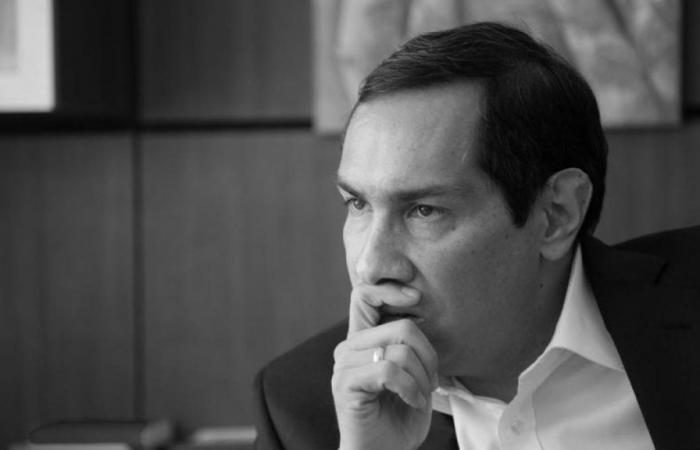The renowned former director of the National Administrative Department of Statistics (Dane) and founder and manager of Cifras y Conceptos, César Caballero, spoke in an exclusive interview with EL TIEMPO about his new book, The Power of Surveys and about the current panorama of political perception in the country.
According to the criteria of
In conjunction with Editorial Planeta, the renowned pollster and analyst explores the history of the electoral polling industry in Colombia, its role in democracy, the use of these in electoral campaigns and the ethical tensions that arise from the work of the pollster.
How did the idea of writing a book on this topic come about?
The book is the product of my doctoral thesis, which took me 5 years and 10 months to complete at the Javeriana University. My idea was to make a self-criticism of my job as a pollster, to recognize that electoral polls have an influence on the Colombian political process.
Do polls inevitably influence citizens’ votes?
There are two ways to approach this issue, some colleagues of mine believe that surveys are objective, neutral and do not influence citizens’ voting decisions. I move along another line, surveys can be rigorous and transparent, but they are one of the inputs with which citizens make the decision of who they are going to vote for.
Cesar Caballero.
Photo:Courtesy.
Do surveys have an impact on everyone equally or on specific sectors?
In the book I showed that between 12 and 20 percent of people make the decision of who to vote for in the last week. There are even some who decide it at the ballot box and the survey does have a direct impact on them, because there are very few citizens who are really interested in political issues a year before the election. Then there are political structure voters who decide six months before and other groups who choose three months before. So the incidence of the surveys has to vary over time and due to the effect of political structures and financiers, money follows the surveys.
Regarding these structures and financiers, how do you see the influence of the surveys?
I affirm two things, money follows the polls and political structures also follow the polls. The first level of impact that the polls have in the Colombian electoral process is at the beginning of the campaign, whoever does well in the polls, gets the money and the politicians with structure approach him.
Has a politician ever been strengthened because of a poll of yours?
There is a chapter in the book that explains that, for the 2018 elections, more or less in February – March 2017, it had an alliance with Caracol Radio and Red Más to present the polls. We decided to ask an open and spontaneous question: ‘Who do you start voting for?’, some names came up and we pollsters usually put the option of ‘other’ and normally it is not very big. I found it curious that in the open question, the ‘other’ was very big, I started looking at the answers, and with different phrasings, they said ‘whoever Uribe says’. We said that about 14 percent of Colombians, in February – March 2017, would be willing to vote for whoever Álvaro Uribe said. People began to say ‘whoever Uribe says’ and indeed Iván Duque ended up being President of Colombia.
Do politicians court pollsters?
Politicians visit you, some don’t know you, there are others who talk to you. Some hire surveys, they have hired me and others ask for the favor of being included. Presidential candidates are constantly saying, ‘Hey, put me here, I exist.’ There is a case that is public, the complaints of Rodrigo Lara, who was doing well in the Mayor’s polls and something happened, the polls stopped favoring him and the last month went into a tailspin. I don’t think a single survey could have destroyed it, but evidently the funders follow the surveys.
Does the survey industry in Colombia offer a good quality product?
One of the efforts I make in the book is to present a reading of the history of polls in Colombia. In 1982 there were two firms, by 2007, when Cifras y Conceptos was created, we were the fifth, today in the National Registry of Interviewers we are about 117 firms, it is a growing industry. Colombia has good, average and bad pollsters, like every industry. I have a distance about the way I evaluate surveys, surveys are not made to predict the future, they are a snapshot of a moment and provide elements of judgment for people to make decisions.
There is a supply of low-quality products, which I call surveys. In the book I also explain that a survey requires time, resources and a scientific method. Surveys are very low cost, but of very low quality. We have a challenge in explaining to people that we have unfair competition.
What are the main types of voters you talk about in the book?
There is a group of voters, about 20 or 25 percent of the population, who have an ideological affinity with a party. The second group are voters who are interested in political issues but who are not part of a political structure. These voters make the decision of who to vote for three months before the campaign officially begins. Then there are some citizens who always vote, but who can decide for one or the other, they fluctuate and are persuaded by the debates and the campaigns. The other twenty percent are those who make the decision of who to vote for in the last week.
Another four percent go to the polls to damage the vote, because it is their way of protesting and others vote out of anger and do everything possible against a certain candidate. There are different tactics that citizens use, for example, we have discovered that there is a group of Colombians who like to lose, who do not want to feel responsible for any ruler and so they always vote for the one they know is going to lose. Others consider that the opposition is important and vote for second so that the winner does not have such an advantage.
And what is the basic scheme that strategists draw up based on the information from the surveys?
At the beginning of the campaign, you have to speak to a niche and after consolidating that niche you have to open up to a broader segment. That is why campaigns start off very radical and then everyone ends up trying to move to the center, because the bulk of the undecided are in the center.
Does this Government pay attention to the polls? They seem not to be responding to some generalized perceptions that are reflected in the disapproval figures.
The president is probably not wanting to speak to the majority of the population, but to his segment that continues to support him, he has 38 percent according to the last survey we published. I think he is wrong, because he is the President of all Colombians and he should call for National Unity, but he decided not to do so, what he has is not negligible and electorally it could be a winning strategy. However, the two worst-rated ministers were Carolina Corcho and Irene Vélez and neither is still a minister. I am not saying that the survey knocked them down, but the presidents look at those studies.
Some analysts have spoken of excessive communication on the part of the current Government. Do some citizens want to disconnect from politics during a certain period of the quadrennium?
Polls show that ordinary citizens do not want to talk about politics all the time, they want to get interested a few months before the elections. In our focus groups, even people who support the President feel that the pace is overwhelming. The rulers in Colombia are used to the fact that the party of power is set with bambuco, if in the case with cumbia, Petro likes carranga and it is too exhausting, one can go out and dance a carranga piece, but one cannot bear to dance the whole party ready to go.
It is the President who unleashed the presidential campaign early with his statements, he precipitates that people are officially already in the campaign. It seems like a mistake to me and I think we should at least hold out until March or April of next year.
What are the biggest challenges of conducting surveys in a country as geographically and demographically complex as Colombia?
The first challenge is that the geography of the cities in Colombia has changed, we no longer have so many open neighborhoods, but rather closed complexes, so passing the doorman is a very important obstacle, but all of us colleagues find ways to solve this issue. In addition, there are new technologies and we have to adapt, until recently we did all the surveys on paper, everything is now digital.
But people like to answer surveys, they like to feel that their opinion is important and fortunately we can say that people continue to answer our surveys. I always like to say that surveys fulfill a social function of citizen control over the rulers. Roy Campos, a Mexican pollster, says that polls are the voice of the common citizen that reaches the ears of the powerful, because finally the first thing we do is ask the common citizen and there is not a politician who resists a survey.
SANTIAGO MALAGÓN RESTREPO – POLITICAL EDITORIAL






